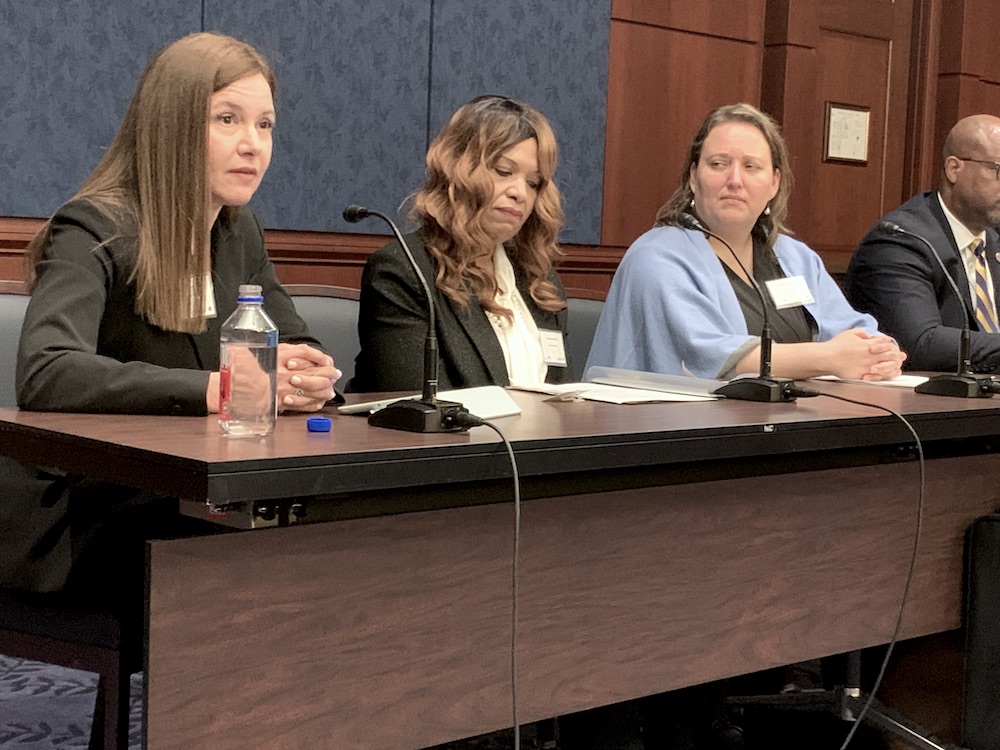WASHINGTON, D.C.—The distance we walked was short, but the list of issues raised in Congress was long during Thursday’s first-ever “100 Superintendent March” of Latino and Black K12 district leaders in Washington, D.C. The superintendents, who represented 21 states, beseeched elected leaders to provide more financial and political support for a range of challenges that are standing in the way of teaching and learning.
The march is on its way to becoming an annual event organized by the Association of Latino Administrators and Superintendents and the National Alliance of Black School Educators. The five superintendents who spoke in a hearing with congressional staffers at the U.S. Capitol raised the alarms on student mental health and teacher shortages. “The students are the ones who are hurting and when they hurt, we all hurt,” lamented Diane Hatchett, superintendent of Berea Community Schools in Kentucky.
More than half of Berea’s students have struggled with mental health recently, Hatchett said as she told the story of receiving a call at 11:45 p.m. one night last year informing her that a 14-year-old boy in the district had committed suicide. The boy, whose father and siblings work for Berea Community Schools, had been playing video games with friends earlier in the day but an alarm was raised when he did not show up for his football team banquet.
The suicide sent shockwaves through the district, leaving traumatized friends, teammates and educators to question what they could have done to help the student. Hatchett pressed Congress to allocate $4 billion for mental health and well-being services in schools. “Mental health touches every socioeconomic group, it touches every race, every gender,” she asserted. “There’s no escape.”
Today’s school accountability systems—particularly the way that assessment results are used “as a hammer against districts”—are putting further pressure on students and teachers, cautioned Karla Loría, superintendent of the Adams 14 School District near Denver. Most assessments do not account for the experiences of the whole student, such as race, background, poverty levels, disability and mobility, English-language learning and trauma.

“Our system fails to serve the whole child,” Loría said. Every school and district being monitored under Colorado’s accountability system is rural, poor or has high populations of English learners, she pointed out, adding that her district is trying to “change the narrative” by testing multilingual learners in their native languages and in English. And these students are showing growth.
She urged Congress to work with district leaders to revamp accountability systems to make them more expansive and “ensure states do not weaponize accountability against our most fragile students,” she said.
100 Superintendent March takes on teacher shortages
Teacher shortages now impacting more than just STEM, special education and other specialized disciplines, warned Dana Bedden, superintendent of the Centennial School District near Philadelphia. The impacts of this “huge shortage” are being felt in declining teacher morale, student achievement and community engagement, added Maria Navarro, superintendent of Charles County Public Schools in Maryland.
More from DA: State takeovers are traumatic. Do they actually turn schools around?
Funding teacher preparation training programs that prioritize diversifying the pipeline will give superintendents more hiring flexibility and be a critical step toward ending the staff shortages, Navarro said. She urged Congress to support President Joe Biden’s budget proposal, which includes more than $90 million for professional development and $132 million for teacher quality partnership programs.
“If we have this federal funding, my colleagues and I can figure out very creative ways to get people to come into the professions,” she said.
Superintendent Francisco Duran of Arlington Public Schools urged all superintendents to reach out to elected officials and advocate for their students, staff and district on mental health, teacher shortages, English learners and other issues putting pressure on K12. “If we don’t tell our story, it will be told for us and not in a way that is going to benefit what our students need or what we need as superintendents,” Duran concluded. “As you go back to your respective communities, how are you getting more people to hear the real narrative, the real story, the real needs and [how are you] challenging and confronting the headwinds that are out there right now against public education?”









